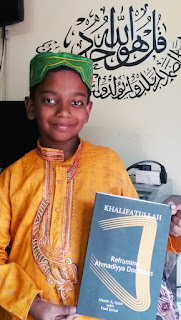 In
the Friday Sermon of 23 November 2018 (14 Rabi’ul Awwal 1440 AH)
delivered at Tenkasi during his recently concluded tour of Tamil Nadu
and Kerala (South India); Imam- Jamaat Ul Sahih Al Islam Hadhrat
Muhyi-ud-Din Al Khalifatullah Munir Ahmad Azim Saheb (atba) of
Mauritius provides an illuminating discourse on the concept of
Waliullah in the Islamic spiritual tradition.
In
the Friday Sermon of 23 November 2018 (14 Rabi’ul Awwal 1440 AH)
delivered at Tenkasi during his recently concluded tour of Tamil Nadu
and Kerala (South India); Imam- Jamaat Ul Sahih Al Islam Hadhrat
Muhyi-ud-Din Al Khalifatullah Munir Ahmad Azim Saheb (atba) of
Mauritius provides an illuminating discourse on the concept of
Waliullah in the Islamic spiritual tradition. All through history, the world of Islam witnessed the appearance of several great savants; Divinely-imbued souls as the Pole Stars of the Religion and the Way; the Luminous Moons of the Faith- people whom devout Muslims over the millennium revere as no less than the spiritual heirs of the Holy Prophet Muhammad (sa). These perfect followers of the Holy Prophet (sa) had been blessed with the direct descent of Divine Knowledge, Divine Revelations, and Divine Words on their persons, and their supplications were almost always accepted. Indeed, such followers of the Muhammadan Light in the Spiritual Path, imbued as they are with divine qualities; they aspire to cultivate a direct relationship with one’s Maker and live secluded behind the curtain of Divine intimacy. Like the Qur’an says: “Verily, My Protecting Friend is Allah, Who has revealed this perfect Book and He takes into (His) protection all the righteous.” (7:197)
A Hadith-e-Qudusi recorded in Sahih Al Bukhari reads as follows: “My servant keeps drawing nearer to Me with voluntary works until I love him. And once I love him, I become his hearing, with which he hears, his sight, with which he sees, his hand, with which he seizes, and his foot, with which he walks. If he asks Me, I will surely give to him, and if he seeks refuge in Me, I will surely protect him.”
Those individuals with whom Allah converses more directly and frequently than with other believers belong to the class of Friends of Allah (Auliya). In the spiritual terminology, such persons are described under different ranks and stations- Wali, Muhaddith, Mujaddid, etc. - all of whom receive their light from the Divine Light and thereby revive the knowledge, wisdom and blessings of the Prophets and Messengers of the previous era. The Light of Allah emanating from theses spiritual lamps illuminate the path of the Divine seekers in Islam.



